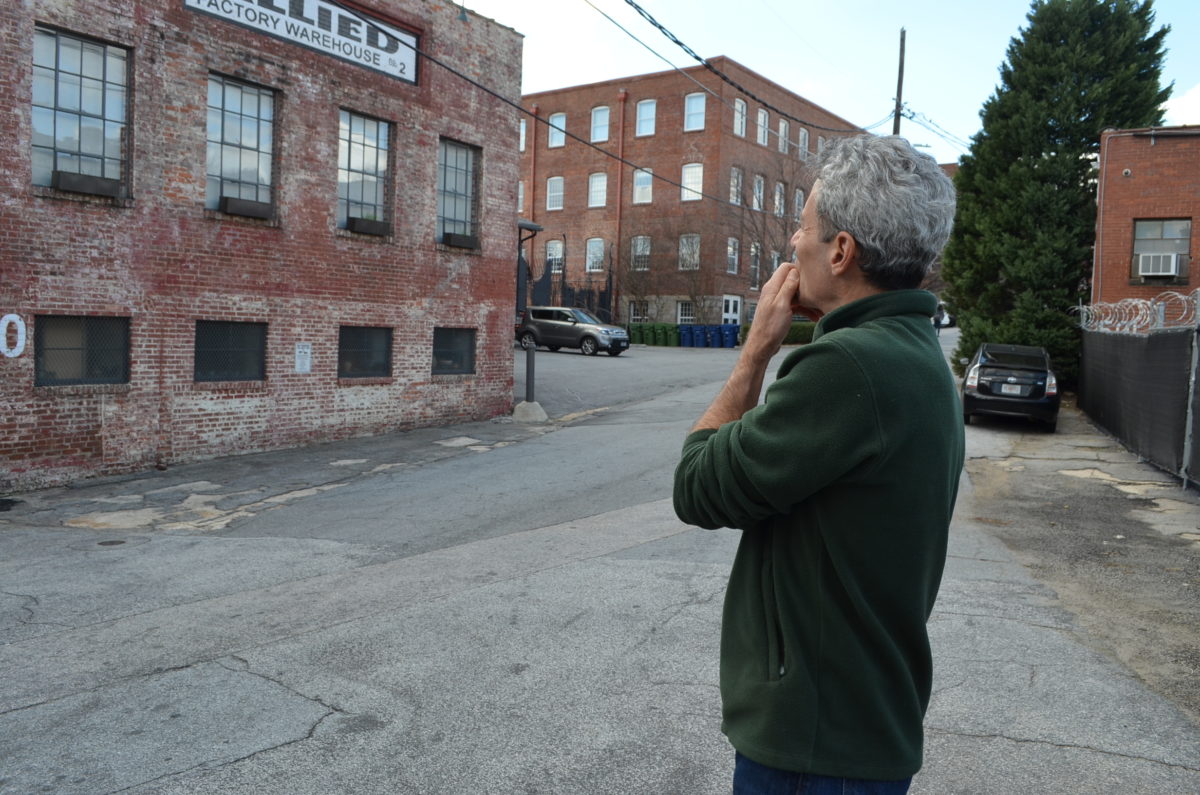Proposed Means Street Historic District Sparks Debate

Stephannie Stokes / WABE
Means Street is a short narrow road near train tracks west of Georgia Tech. Square nondescript brick buildings rise up on each side.
As Bill Gould walks up the street, he says it gets its name from an early Atlanta landowner, Alexander Means. That name is part of what first drew Gould here almost 30 years ago.
“All these buildings were largely abandoned, covered in Kudzu with the windows all missing. And it was really beautiful, but a little bit edgy, scary and mean, so,” Gould says.
Gould ended up buying one of those buildings. Like many of the property owners on this street, he repurposed it. He turned it into lofts, where he’s lived since.
He points it out, a factory from the late 1800s.
“It used to be the Standard Oil Kentucky building,” Gould says. “It’s one of a number of buildings on Means street that were devoted to the petroleum industry at the turn of the century.”
The oil produced here supplied downtown Atlanta, he says.
Several other buildings down the street were for manufacturing, hundred year-old furniture plants. Around the corner, there are also early storefronts, dating back to the 1930s.
All of this, Gould says, makes it a special place.
“It’s really an entire block that has been preserved and left off the radar of Atlanta’s recent development,” Gould says.
Now, it could remain off that radar. The city has proposed making the dozen or so buildings around Means Street a historic district, because of their ties to west Atlanta’s early economy.
The area got the city’s attention because one building here was threatened recently. It was an old retail space that became a Georgia Tech mainstay, the Engineer’s Bookstore.
Its new owner wanted to demolish it to build a gas station. And that prompted an outcry from preservationists and people in the surrounding neighborhoods.
But many of the other property owners around Means Street are not happy with the city’s solution.
“This came down on our heads like a ton of bricks,” says Derek Aynsley, president of Aderhold Properties.
His company owns several of the buildings in the small proposed district. One is a converted music studio. Another, the Roxy Hotel, is apartments.
Aynsley says, the majority of the property owners don’t want the extra rules that come with a historic district.
“It is extremely onerous in its denial of pre-existing property right. What can be done to the property into the future and more importantly what cannot be done,” he says.
For example, if he wants new windows on the warehouses he owns, he says he’ll need the city’s permission.
Ainsley says the historic district just seems like a ploy to keep a gas station from replacing a plain, one-story brick building.
“I would ask you to justify for me under what sets of standards, either architectural or cultural merit, that building deserves preserving,” Aynsley says.
The Atlanta Contemporary Art Center, whose home is along Means Street, is also opposing the designation. The director there says she worries it could stunt the organization’s growth.
The benefit of preserving Means Street, however, may outweigh the property owners’ concerns, according to City Council Member Ivory Young, who represents the area.
“It is really an asset for the whole city,” Young says.
Young also says the historic designation has support beyond the Means Street district, in the adjacent neighborhoods and in the rest of Atlanta.
“Means Street is an area that has a one of a kind flare and flavor,” Young says. “If we don’t take some extraordinary measures to protect that asset, it’s liable that almost anything could happen.”
And that is what Gould is worried about. He is now one of the only property owners backing the proposed district.
“Atlanta has a long history of not having a great deal of respect for its built history,” Gould says. “We’re very much a tear down and build new kind of city.”
He says the city should make an extra effort to preserve what’s left.
The proposal to protect Means Street with a local historic status needs the approval of the Atlanta City Council. The council is scheduled to vote on the issue Monday.
9(MDAxODM0MDY4MDEyMTY4NDA3MzI3YjkzMw004))








